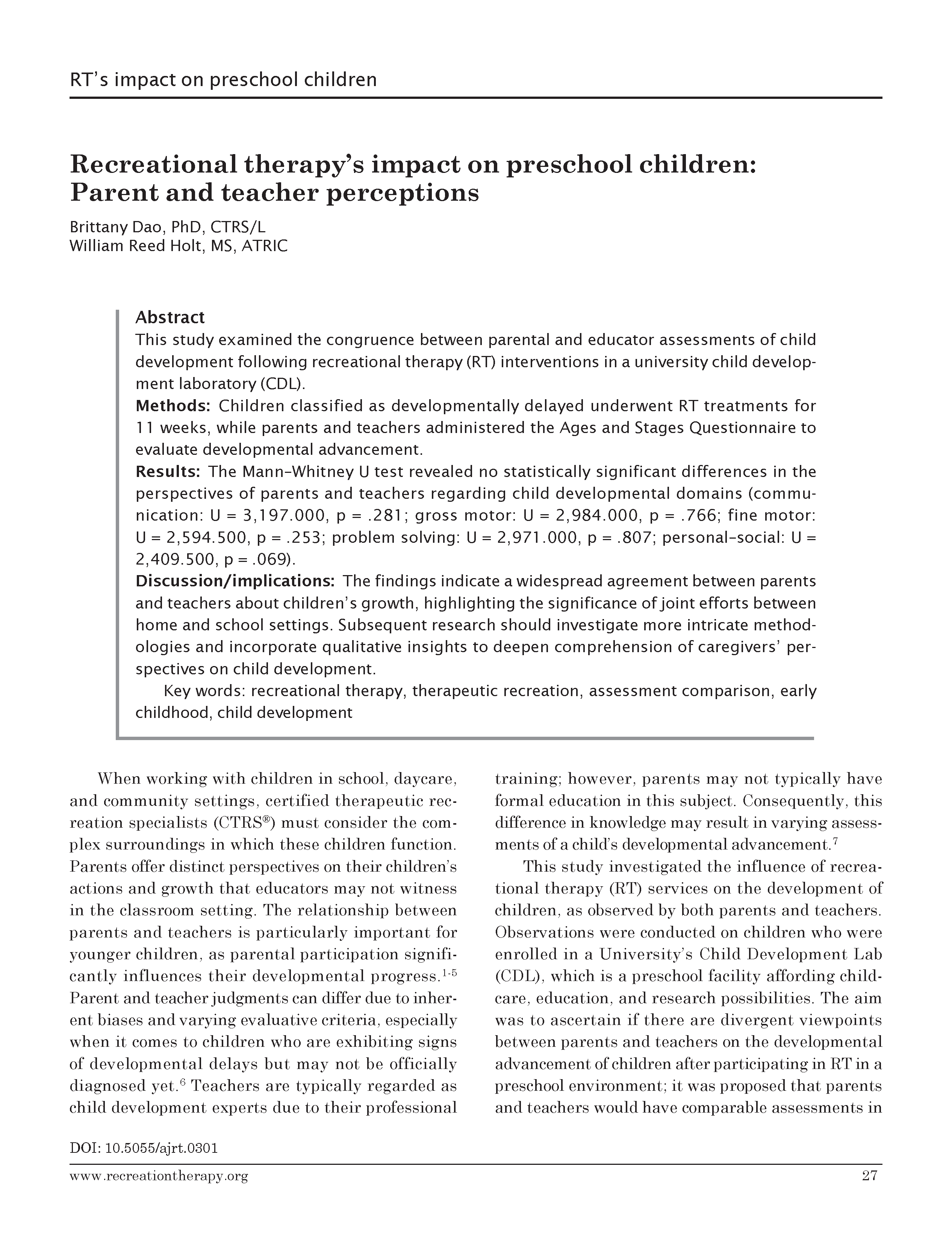Recreational therapy’s impact on preschool children: Parent and teacher perceptions
DOI:
https://doi.org/10.5055/ajrt.0301Keywords:
recreational therapy, therapeutic recreation, assessment comparison, early childhood, child developmentAbstract
This study examined the congruence between parental and educator assessments of child development following recreational therapy (RT) interventions in a university child development laboratory (CDL).
Methods: Children classified as developmentally delayed underwent RT treatments for 11 weeks, while parents and teachers administered the Ages and Stages Questionnaire to evaluate developmental advancement.
Results: The Mann–Whitney U test revealed no statistically significant differences in the perspectives of parents and teachers regarding child developmental domains (communication: U = 3,197.000, p = .281; gross motor: U = 2,984.000, p = .766; fine motor: U = 2,594.500, p = .253; problem solving: U = 2,971.000, p = .807; personal–social: U = 2,409.500, p = .069).
Discussion/implications: The findings indicate a widespread agreement between parents and teachers about children’s growth, highlighting the significance of joint efforts between home and school settings. Subsequent research should investigate more intricate methodologies and incorporate qualitative insights to deepen comprehension of caregivers’ perspectives on child development.
References
Bodnarchuk J, Eaton W: Can parent reports be trusted? Validity of daily checklists of gross motor milestone attainment. J Appl Dev Psych. 2004; 25: 481-490.
Dieterich S, Landry S, Smith K, et al.: Impact of community mentors on maternal behaviors and child outcomes. J Early Intervention. 2006; 28(2): 111-124.
Fenson L, Marchman VA, Thal DJ, et al.: The MacArthur- Bates Communicative Development Inventories (CDIs): User’s Guide and Technical Manual. 2nd ed. Towson, MD: Brookes Publishing, 2007.
O’Neil L: Embodied hermeneutics: Gadamer meets Woolf in “a room of one’s own”. Educ Theory. 2007; 57(3): 325-337.
Squires J, Twombly E, Bricker D, et al.: ASQ-3 User’s Guide. Towson, MD: Brookes Publishing, 2009.
O’Connor M, Rosema S, Quach J, et al.: Parent and teacher perceptions of emerging special health care needs. J Paediatrics Child Health. 2016; 52(10): 950-956. DOI: 10.1111/JPC.13188.
Greenfield P, Quiroz B, Raeff C: Cross-cultural conflict and harmony in the social construction of the child. New Direct Child Adol Dev. 2000; 2000: 93-108. DOI: 10.1002/CD.23220008708.
Sharpe P: Parental involvement in preschools, parents’ and teachers’ perceptions of their roles. Early Child Dev Care. 1991; 71: 53-62. DOI: 10.1080/0300443910710105.
Frosch CA, Schoppe-Sullivan SJ, OBanion DD: Parenting and child development: A relational health perspective. Am J Lifestyle Med. 2019; 15(1): 45-59. DOI: 10.1177/1559827619849028.
Anderson L, Heyne L: Therapeutic Recreation Practice: A Strengths Approach. State College, PA: Venture Publishing, 2011.
Cooper VL, Porter HR: A comparison of recreational therapy and child life practice: Similarities, differences, and opportunities. Am J Rec Ther. 2016; 15(2): 13-28. DOI: 10.5055/ajrt.2016.0102.
Heyne L, Anderson L: Therapeutic recreation in schools: An underutilized service. TASH Connections. 2004; 30(5/6): 12-15.
Hoag JA, Bingen K, Karst J, et al.: Playing with a purpose: The impact of therapeutic recreation during hospitalization. J Pediatr Hematol Oncol Nurs. 2022; 39(1): 6-14. DOI: 10.1177/27527530211059437.
Bronfenbrenner U, Morris, PA: The bioecological model of human development. In Damon W, Lerner RM (eds.): Handbook of Child Psychology: Theoretical Models of Human Development. Hoboken, NJ: John Wiley & Sons Inc, 2006: 793-828.
Porter HR: Theories, models, and concepts (chapter 10). In Porter HR (ed.): Recreational Therapy Basics, Techniques, and Interventions. Enumclaw, WA: Idyll Arbor Inc., 2016: 97-127.
Bronfenbrenner U: The Ecology of Human Development: Experiments by Nature and Design. Cambridge, MA: Harvard University Press, 1979.
Rothstein A, Miskovic A, Nitsch K: Brief review of psychometric properties and clinical utility of the ages and stages questionnaires, third edition for evaluating pediatric development. Arch Phys Med Rehab. 2017; 98: 809-810.

Published
How to Cite
Issue
Section
License
Copyright 2000-2025, Weston Medical Publishing, LLC and American Journal of Recreation Therapy. All Rights Reserved.

